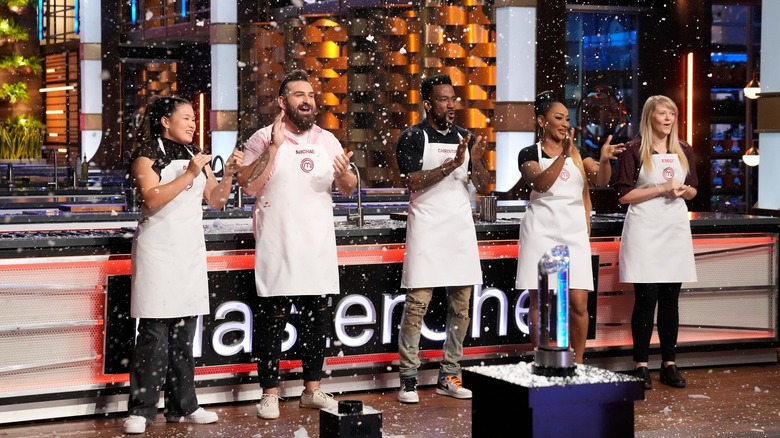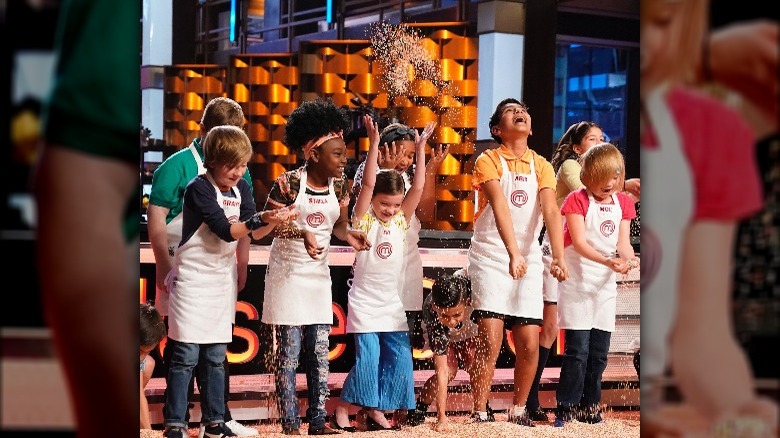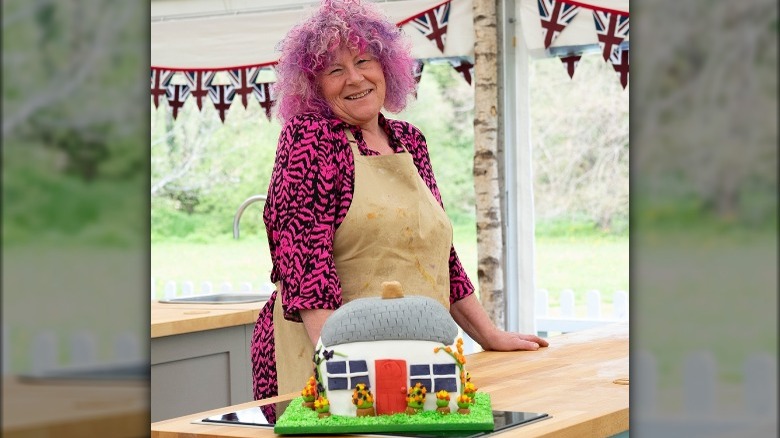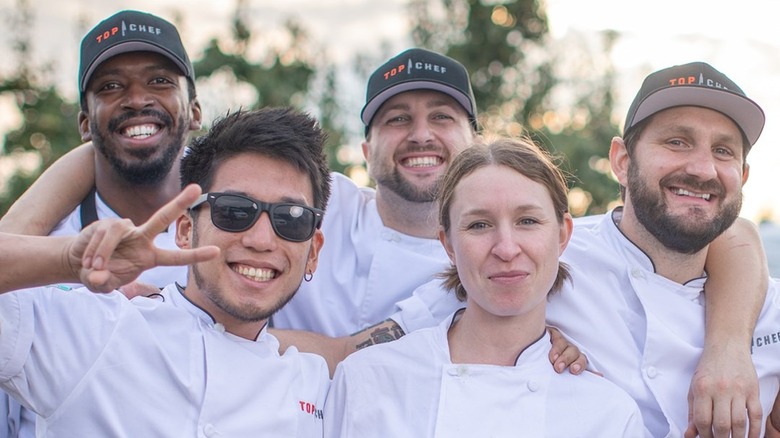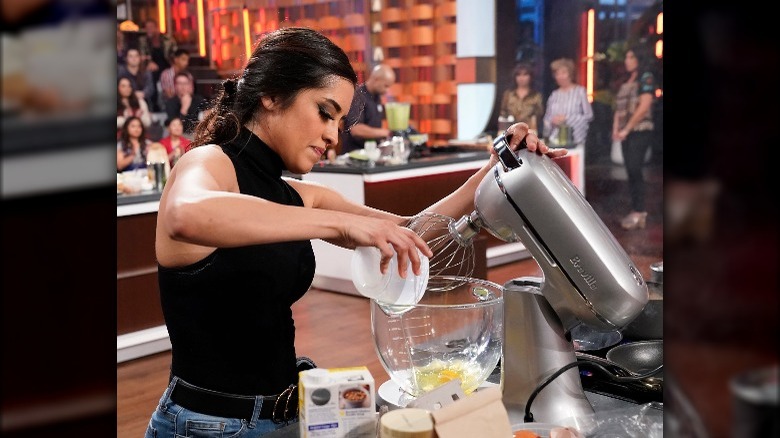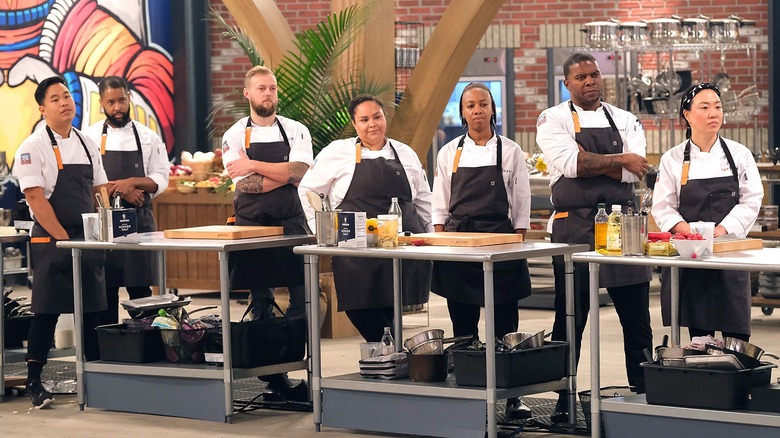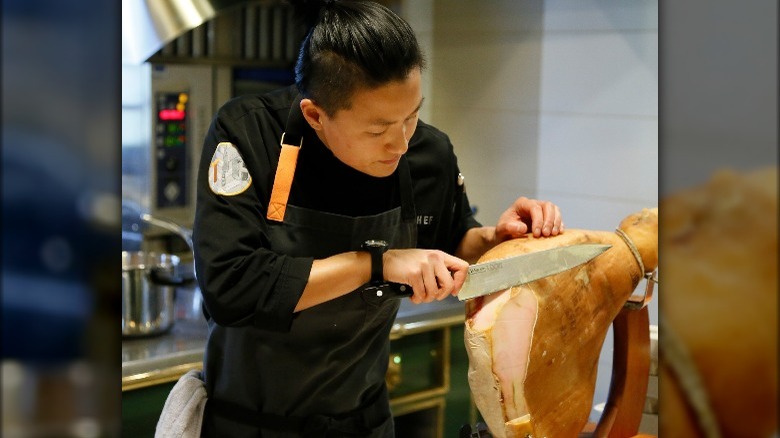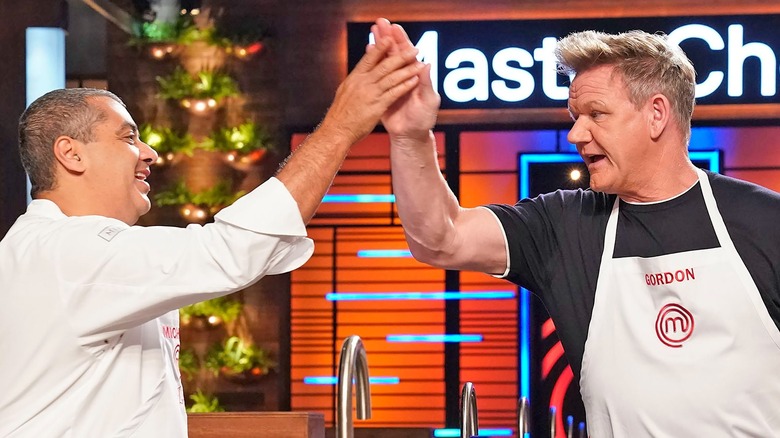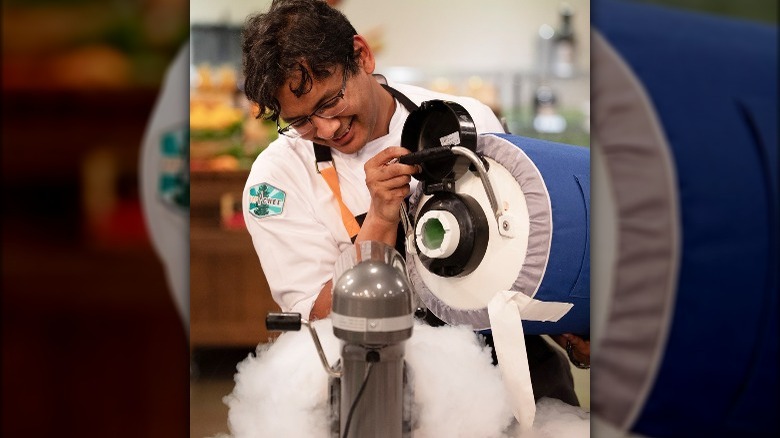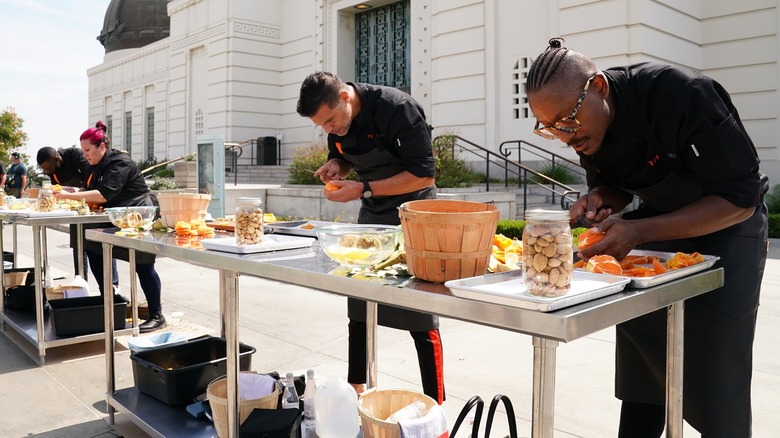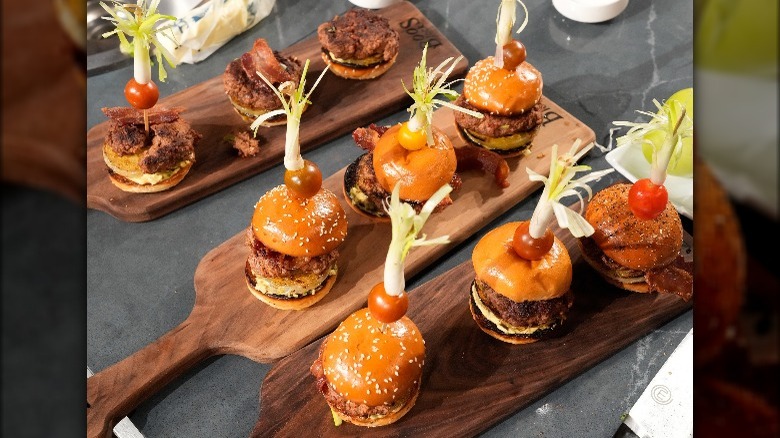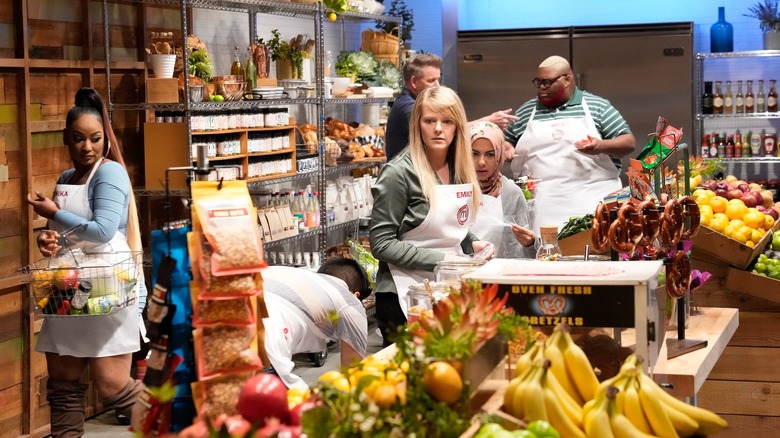Weird Rules Cooking Show Contestants Are Forced To Follow
Whether you want to watch the best of the best in the culinary world compete for a top prize, or you prefer to watch amateur chefs impress everyone including themselves, there is a cooking show on television for just about everyone these days. These popular competitions come in all shapes and sizes, from smaller-scale baking shows to epic matchups that span all kinds of cuisines. Regardless of which cooking show you prefer to watch, one thing remains constant: There is a lineup of eager contestants with the singular goal of winning some sort of prize that's on the line.
These contestants are subject to a series of rules when they sign up to compete. Some of these rules may seem like no-brainers (we do not want to see any cheating), but other rules may not be as obvious as you would think. In fact, there is quite the list of rules contestants are forced to adhere to before, during, and after filming. These rules can range from the requirements they must meet in order to be selected to who they are and are not allowed to speak to once on set. If you ever dreamed of being on a cooking competition, or you want a glimpse behind the scenes at what goes into the making of your favorite show, here are some hard and fast rules that must be followed by the contestants.
There are usually age requirements
You might think that anyone can apply to appear in a cooking competition, and in many cases that is mostly true. There are, however, a few key requirements you need to pass in order to be considered. Some requirements have to do with your skill level in the kitchen, but other metrics are a bit more black and white, including your age. These requirements vary from show to show, so if you were ever wondering if you could try your hand at one of these competitions, you may want to double-check your date of birth before applying.
In a casting call for the cooking competition Sugar Rush found on Backstage, contestants were required to be between the ages of 21 and 69. Beyond that, there were not many additional demographics that the show was looking at when considering which talent to cast in the show. Of course, other cooking competitions will have more obvious age limitations. If you were looking to compete on a show like MasterChef Junior, you would have to be between the ages of 8 and 13, according to the show's website. So, no competing on that show if you are old enough to drive a car.
Your culinary skill level must be disclosed
Cooking competitions are not only looking at demographic information when selecting which contestants will appear in the show. Depending on what competition you are applying for, your level of culinary skill will likely need to be disclosed. After all, if you want to compete on a show like Nailed It! which is known for less-than-amateur bakers attempting (and oftentimes failing) to recreate elaborate cakes and pastries, then Netflix probably is not searching for someone skilled enough to compete on The Great British Bake Off.
That said, The Great British Bake Off does have certain limitations when casting their show. While the contestants are highly skilled at baking, they cannot have acquired any professional certifications in baking or food production within the last 10 years, according to the show's website. Whether the cooking competition is looking for newbies or seasoned professionals, it wants to make sure that there is a level playing field amongst its contestants from the start. After all, it wouldn't be nearly as fun to watch Nailed It! with a lineup of contestants who actually know their way around a stand mixer.
You have to sign a nondisclosure agreement
It may come as no surprise, but the episodes of your favorite cooking competition are filmed well in advance of it actually airing on television. Even a show like Food Network's Holiday Baking Championship is filmed in the middle of summer, as host Jesse Palmer disclosed in an interview with Sports Illustrated. That is a considerable amount of time between filming and airing, and the networks want to keep the final results of the competition a secret from the public until the episodes are available to watch. It wouldn't be as exciting to watch MasterChef if you already know who the winner is going to be before the first episode airs, after all.
In order to maintain secrecy, all contestants are typically required to sign a nondisclosure agreement, or NDA, after being selected to appear on the show. For a show like Chopped, contestants must sign a $75,000 NDA promising not to disclose the results of their particular episode, according to E! Online. While eager chefs probably want to tell their friends and family all about their experience on the show, they must wait until the episode airs before discussing the results.
You have to wear the same outfits throughout filming
It can take a considerable amount of time to film just one episode of your favorite cooking competition, but when watching the episode, it can seem like it all happens within the 30 or 60-minute timespan of each episode. A show like Top Chef can easily pull 16 hours or more of work per day when filming, according to a former contestant's interview with Seattle Met. Top Chef is not the only show with long film days — The Great British Bake Off can take 14 hours or more to shoot per day, according to Insider.
Unfortunately for the contestants, long film periods often means that they need to repeat the same outfits throughout filming to maintain continuity (via Insider). And no, the contestants are not afforded five of the same t-shirt, meaning they may need to re-wear the same clothes without washing them. Not exactly ideal conditions, especially for a show like The Great British Bake Off that films rain or shine under its iconic outdoor tent. Reality TitBit goes into a bit more detail, explaining that when contestants wear the same outfits, it makes the editors' jobs easier to string clips together without having to worry about someone's clothes suddenly changing between takes. If you are cast in a cooking competition, perhaps look into buying a few extra of the same t-shirt before arriving on set.
There are usually alternate contestants
Some competitions have the same number of contestants across each episode, like Chopped, which always begins with a lineup of four chefs. Other competitions, like MasterChef, have had varying amounts of contestants over the years. Regardless of how many contestants you see on television, there are typically one or two alternates waiting in the wings.
According to E! Online, five chefs are selected for each episode of Chopped, with the fifth designated as the alternate. The alternate chef is there in case of an event that would disqualify one of the regular contestants, such as a major injury or failing to report to the set. That way, the producers do not have to go looking for a replacement in the middle of filming — they are already there and can step in at a moment's notice. You probably would not recognize when the episode airs if any of the competing chefs were originally selected as the alternate.
The time limits shown on TV are the exact time limits given while filming
One of the hallmark features of any cooking competition is the amount of time chefs have to complete each challenge. It would not be quite as heart-pounding if the contestants had all of the time in the world to cook each dish, not to mention it would make for a more difficult filming experience on set. So, time limits are implemented to keep filming on schedule, as well as to add some drama to the experience.
Those time limits you see on television are not dramatized in any way, as those are the exact time limits contestants have on set, according to E! Online, when talking about the hit TV show Chopped. That can be extra stressful on a show like Chopped, where contestants are not given advance notice on what those mystery ingredients are going to be, and no extra time is given to come up with your ideas, as one former contestant explains on Tasting Table. Once the clock begins, there are no pauses, breaks, or resets. The clock will wind down no matter what, and contestants have to use that time wisely. Chopped host Ted Allen advised contestants to practice cooking various dishes in under 20 minutes as preparation, because that is truly how much time they have while filming (via E! Online).
Recipes and cookbooks are not allowed on set
For many of us, recipes and cookbooks are essential when making dinner at home. How else are we to know if the amount of salt we are adding is too much? While advanced-level and professional chefs may not need to rely on written instruction when preparing a dish, it may be beneficial to have one on hand when competing in a high-stakes cooking competition. Unfortunately, such an advantage is not permitted in many instances, including MasterChef.
According to The Cinemaholic, cookbooks are plentiful where the contestants are living during filming, and those resources can be used as a reference if one were to study during the off days. However, once on set, those aids are not permitted, and neither are cell phones, which could be used to access online recipes. It makes it all the more impressive to see elaborate dishes being made under such a tight time frame when you know that each step is coming off the top of the contestants' heads. Other shows like Nailed It! provide at least somewhat vague recipes to contestants that may not have as much experience in the kitchen.
Contestants are not allowed to bring most of their own tools
Like any other competition you might watch on television, cooking shows want to keep things as fair as possible, with each contestant stepping out onto an even playing field. That means making sure the contestants are at around the same level of proficiency in the kitchen, as well as making sure the tools those contestants are using are the same (unless, of course, you are competing in a show like Next Level Chef, which is known for separating its contestants into three largely different cooking environments with widely varying equipment).
While the majority of cooking tools are provided to contestants, there is one category of equipment that chefs are allowed to bring, at least for a show like Chopped: their knives. According to E! Online, contestants can bring up to seven knives for use during the competition. This is likely due to the fact that chefs take great pride in their knives, as E! Online explains, so it may not be worth it to try to force a new, unfamiliar set of knives onto a chef.
Contestants cannot converse with certain people while filming
In addition to signing nondisclosure agreements to maintain secrecy after filming (via E! Online), contestants have to maintain discretion in regard to who they communicate with during production. Even before the finale is reached, contestants are closely monitored to make sure they are not speaking with the outside world. According to Seattle Met, contestants for the show Top Chef are assigned handlers not only to make sure they arrive on time each morning, but to essentially be chaperoned everywhere they go.
Not only can contestants not talk to the general public during filming, but they also cannot interact with the producers. One producer for Top Chef explained to Seattle Met that they were on set to solve any issues when they arise, but otherwise they would not speak to any of the contestants. It may feel a bit bizarre to be brought to set and not be allowed to chat with certain people, but it is all a part of keeping a level playing field as well as keeping the final results a secret from the public.
Some appliances must be shared
No matter which cooking competition a contestant is appearing in, they will usually be given their own individual workstation with a selection of tools, equipment, and appliances that is for their use only. Contestants can bring their own knives from home for a show like Chopped (via E! Online), but in general, most of the tools are provided by the show and are plentiful for each contestant to use without worrying about sharing. But there are some appliances that are few and far between on set, and that decision is intentional.
At least for a show like Chopped, there is only one or two of each appliance on set that the contestants are forced to share. According to E! Online, the decision to include only one ice cream machine was intentional, despite multiple contestants wanting to use that appliance in a single round. Especially for a show like Cutthroat Kitchen, which is designed to throw various curveballs at the contestants during cooking, it is to the producer's benefit to keep certain tools or appliances at a minimum to create added stress in the kitchen.
Your workspace might be inspected as part of judging
When it all comes down to it, the purpose of most if not all cooking competitions is to present the best dish to the judges. The food is usually judged based on taste, presentation, creativity, and in some instances, the inclusion of required ingredients. But what you may not realize is that for some shows, the judging does not stop at the edge of each plate.
While it is not shown on air, the judges will sometimes inspect each chef's workspace as a criteria for how they judge the overall dish. According to E! Online, the contestants on the TV show Chopped are not only critiqued on the food itself, but also on their workspace. During this inspection, any number of things could be looked at or examined that is part of the overall judging of a dish. Ingredients that did not make it onto the plate might be tasted, and cleanliness is also considered when visiting the workspaces. It is all a part of how the judges assess each contestant and, depending on what they find, it may play a huge role in who is ultimately eliminated.
You must prepare extra plates for filming
Next time you watch your favorite cooking competition, count how many plates a contestant prepares for the judges. Depending on what the camera captures, you may notice more finished plates at the chef's workspace than there are judges. Including extra dishes is not just something a contestant may do to hedge their bets that the best meals are placed in front of the judges, it's a requirement for the show.
In most instances, a cooking competition will include B-roll footage of the dishes that a chef has prepared, which can take some time to capture. This could take place while the judges are eating the remaining dishes, so the show might require an extra dish to be prepared for the sole purposes of filming and photographing. According to E! Online, it can take hours to film this additional footage, and the production does not want to hand off a plate of room-temperature food to the judges. Also, for a show like Chopped that does a grand reveal of which dish is eliminated, it is important for there to be an untouched dish without any bite marks for that dramatic moment when Ted Allen lifts up the silver cloche.
In other shows like Top Chef, the photography and B-roll filming happens before judging. According to NY Daily News, chefs must prepare two plates of each dish, one of which is grabbed by the production team to film before the judges get to try them.
Food cannot go to waste
Perhaps most importantly, the food you see on your favorite cooking competition cannot go to waste. Depending on how many contestants there are on each television show, there can be a lot of food produced in a short amount of time, and the production does not want the food to be tossed at the end of a filming day. Of course, it is a different story when the food is undercooked or inedible, but most of the time, there are some stellar plates of food that will wind up going home with somebody. On The Great British Bake Off, baskets are prepared at the end of filming days with each contestant's baked goods, so everyone has a chance to try what everyone prepared that day (via People Magazine).
That also goes for the unused food from the pantry areas. Those pantries are stocked with just about every food item a chef could need, but depending on the challenge, only a small portion would be used. On Top Chef, the producers get to take any unused food home at the end of the day, since filming can take weeks and pantries will need to be restocked periodically with fresh ingredients. In an interview with Seattle Met, one of the producers from Top Chef recalled fondly the many times the production team got to bring home top-tier ingredients like lobster and caviar home with them.
